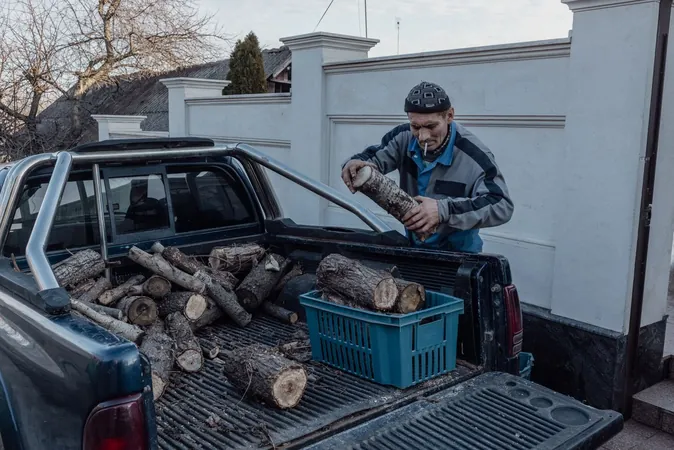
Stranded in Transnistria: The Energy Crisis Deepens as Locals Search for Answers
2025-01-10
Author: Yan
Stranded in Transnistria: The Energy Crisis Deepens as Locals Search for Answers
In the small village of Varnița, Moldova, residents are grappling with the harsh realities of an energy crisis that has left thousands in the cold. Situated near the Russian-controlled region of Transnistria, Varnița relies heavily on the energy infrastructure of this disputed territory. The recent decision by Russia to halt gas supplies has prompted a desperate scramble for accountability among the locals.
As gas workers from TiraspolTransGaz, the regional supplier, visit homes to ensure gas taps are shut off, the mood is somber. Local authorities have announced that the gas storage available in Transnistria will only last for another 24 days following the cessation of Russian supplies. With a population of approximately 360,000, many residents in Transnistria have already found themselves without gas, electricity, or water since the year began.
Moldovan Prime Minister Dorin Recean has characterized the crisis as a strategy by Russia to exert its influence over Moldova, particularly with parliamentary elections looming this autumn. Authors of the crisis are being debated, as self-styled authorities in Transnistria claim they were caught in a political clash between Moldova and Ukraine, while Moldovan officials insist it is Russia's responsibility due to its failure to adhere to transit agreements for natural gas.
Before the current crisis, energy was a tool used by Transnistrian authorities to generate revenue, taking advantage of low-cost gas to produce electricity in the Russian-owned Cuciurgan power plant. However, after Russia’s withdrawal from supplying gas, Transnistria has been plunged into darkness, with rolling blackouts now commonplace. In turn, energy bills across Moldova have doubled, leaving many scrambling for alternative heating solutions.
In the face of these challenges, Moldovan President Maia Sandu visited Varnița and promised to introduce biomass power plants to accommodate those affected by the energy shortages. The conversation around energy independence is also turning toward international collaboration, with President Sandu mentioning potential coal sales from Ukraine to help revive energy production in Transnistria.
Opting for electric heaters and wood-burning stoves, locals are doing their best to cope with the new energy landscape. Private citizens like Zarina, a shop assistant from Bender, express a mixture of resilience and frustration, noting that many are left to fend for themselves amid these developments. While some residents continue to have their utilities intact, they look to their families in the countryside for support should the situation decline further.
Retiree Ion Băieșu recalled a lengthy history of energy dependence on the region's Russian patronage dating back three decades. “Russians have kept us hostages for 30 years,” Băieșu reflected, as he rummaged for firewood to heat his home. The older generations remember the struggles of the 1992 Transnistria War vividly and now view their political choices through that lens.
Greater challenges await as local economies dependent on steady gas supplies are now suffering, with factory owners like Tamara Cara investing in generators to keep their operations afloat. Amid this turmoil, the differing narratives portrayed in local media magnify divisions in public opinion: Some residents blame Moldova, while others point fingers at Ukraine or Russia.
Prime Minister Recean emphasizes the need for the 2,000 illegally stationed Russian troops to withdraw for any chance of restoring stability and energy sufficiency in the region. However, the outlook feels obscure to many, as uncertainty looms larger than the realities of their day-to-day lives.
In a world where access to essential resources has become a battleground for geopolitical strategies, the people of Varnița and Transnistria find themselves in a desperate search for solutions and accountability amid a spiraling energy crisis. What remains to be seen is whether they can rally together to find a way through the darkness.

 Brasil (PT)
Brasil (PT)
 Canada (EN)
Canada (EN)
 Chile (ES)
Chile (ES)
 Česko (CS)
Česko (CS)
 대한민국 (KO)
대한민국 (KO)
 España (ES)
España (ES)
 France (FR)
France (FR)
 Hong Kong (EN)
Hong Kong (EN)
 Italia (IT)
Italia (IT)
 日本 (JA)
日本 (JA)
 Magyarország (HU)
Magyarország (HU)
 Norge (NO)
Norge (NO)
 Polska (PL)
Polska (PL)
 Schweiz (DE)
Schweiz (DE)
 Singapore (EN)
Singapore (EN)
 Sverige (SV)
Sverige (SV)
 Suomi (FI)
Suomi (FI)
 Türkiye (TR)
Türkiye (TR)
 الإمارات العربية المتحدة (AR)
الإمارات العربية المتحدة (AR)